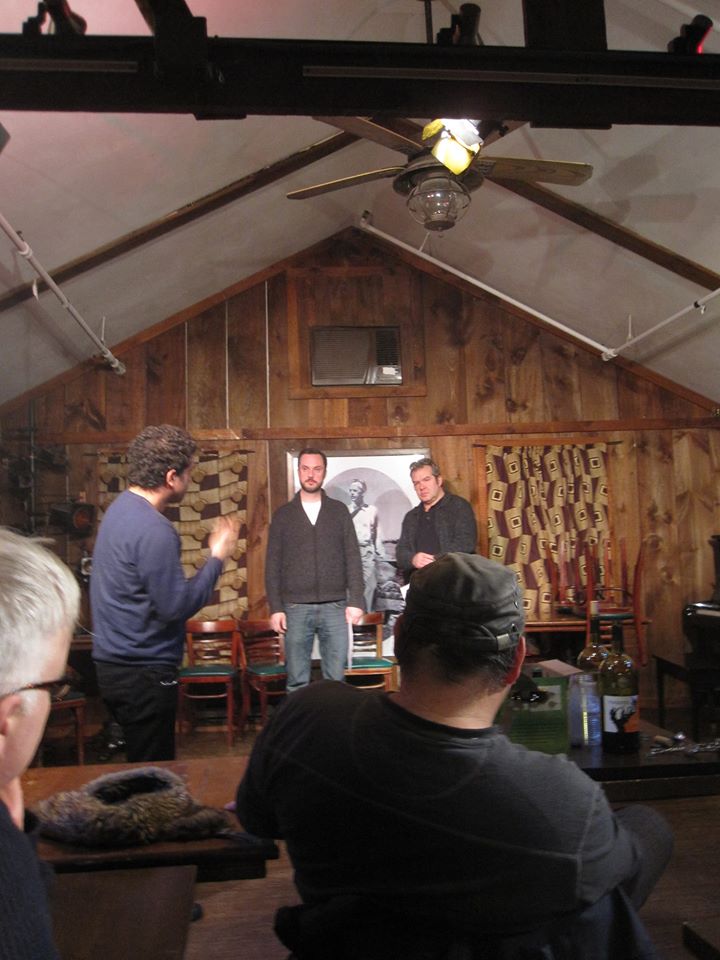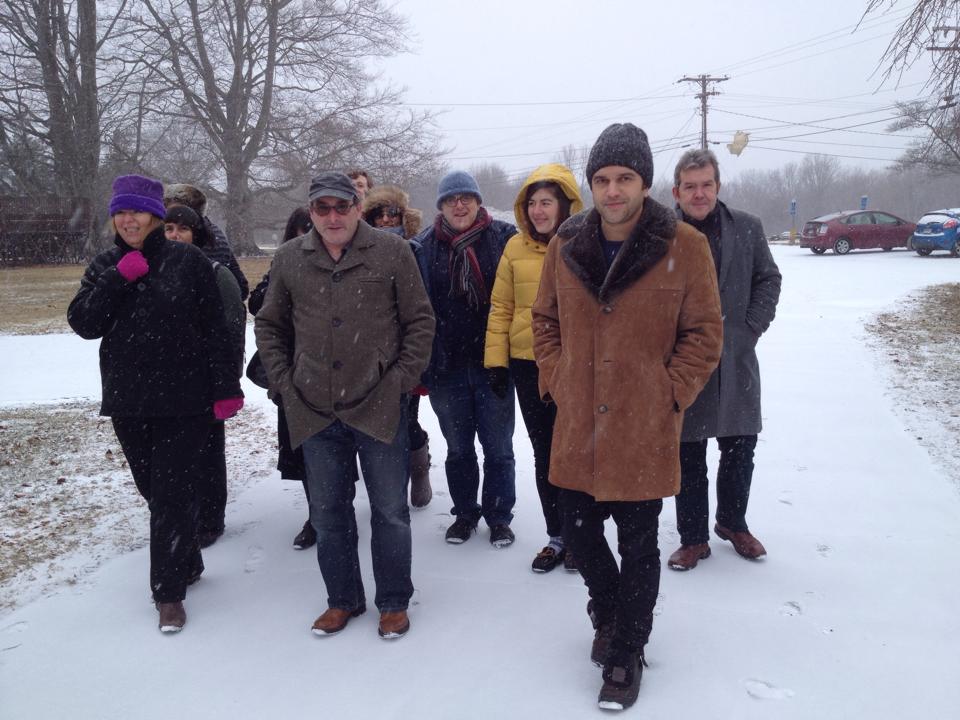18.
Waterford/Manhattan, January 2014
In January 2014 Fence members from Europe and elsewhere tested the water for a proposed full-scale Fence meeting in the USA in 2015. We were hosted by the Waterford, CT, Eugene O'Neill National Theater Institute, and by New York City's The Lark Play Development Center and The Play Company.
In particular we had two key Lark meetings, curated by Catherine Coray, with Doug Howe and Melissa Hardy.
- Translation Conversation with Playwrights & Translators of New York
- Why Translate? Fence Conversation with Stakeholders.

Those participating give an example of the number, calibre and spread of interest and engagement.
Attendees:
From the USA: Paulina Barros, Chantal Bilodeau, Catherine Coray, Whitney Eggers, Cobina Gillitt, Inigo Ramirez de Haro, Melissa Hardy, Marion Holt, Doug Howe, Daniel Jaquez, Mariana Carreno King, Madeleine van Leer, Shahid Nadeem, Amelia Parenteau, Michael Robertson, Andrea Thome, Sarah Cameron Sunde
From outside the USA: Nicolas Billon, Edward Bromberg, Beatriz Cabur, Neil Fleming, Enver Husicic, Jonathan Meth, Hakan Silahsizoglu ,Liv Satchell, Malgorzata Semil, Ulrike Syha.
Additional US Attendees: Nicole Birmann Bloom, Kevin Bitterman, Andy Bragen, Linda Chapman, Mieke Chew, Orietta Crispino, Amy Evans, Catherine Filloux, Nick Frisch, Cobina Gillitt, Jean Graham-Jones, Emily Harney, Elizabeth Hess, Christopher Hibma, Katrin Hilbe, Marion Holt, Megan McClain, Barbara Lanciers, Sarah Rose Leonard, Jessica Lewis, Joyce Maio, Gwyn MacDonald, Kristin Marting, Aaron McKinney, Alba Parejo, Aktina Stathaki, Sarah Cameron Sunde, Caridad Svich, Paul Takacs, Zishan Urgulu, Sturgis Warner, Pia Zaddad
Out of this emerged
..
Key Issues for 2015
1. Readings, productions and audiences
We want to explore the relationship between these three through a variety of field trips, so that we can engage with institutions within their community context.
this will
- Build relationships across NYC in addition to The Lark and Play Company
- Raise the profile of work in translation
- Allow us to interrogate what works, what doesn’t and what might
- Allow participants to spend time together with a shared practical focus, with which to also compare non-USA institutions

2. Three key areas which we will revisit through workshops, meetings, panel discussions
2.1 What are the elements of effective brokerage?
- American hierarchy between artists playwright-translator-director-dramaturg
- Relationship between overseas and diasporic as dynamic
Focus on individual voice / vision rather than particular community;
- getting an individual director interested in a Playwright
2.2 What are the key Issues of theatre translation?
- Text, pretext, context, subtext
transliteration and transposition or language and culture
- Bilingualism and its analogues, such as disability aesthetics
- Translation, adaptation, dramaturgy, collaboration
- The audience: distinction between “I don’t understand what you’re saying” and “I don’t understand what you mean.”
2.3 Approaches to Communication
- Information and knowledge repositories
- Databases
- Online access
- Networks
- People-to-people relationships;
- How to discover, foster and sustain
The goals here:
- A better understanding of the landscape for work which might not originate in US English
- Better thinking and practice on how to negotiate apparent barriers to progression
- Non US participants sharing their experiences of similar and different challenges
- In creating a more coherent picture of how things work in NYC, this will also serve as a useful primer as US participants begin to engage with and interrogate the landscape of their work abroad.
3. Scratch sessions
The principle of scratch is that of a shared laboratory space, which can take different forms.
This may have elements of:
- a translation slam;
- sharing work-in-progress,
- short extracts designed as an introduction to participants (instead of presenting about themselves)
Scratch is designed to allow participants to build relationships through practical work and feedback on it
Fence 20
Background: Context to plans for New York / Connecticut 2015 meeting
The Fence was set up 10 years ago as an Anglophone network for working playwrights and key figures – cultural operators - who make playwriting happen, across Europe.
The Fence aims to open up mobility possibilities and routes to work opportunities for playwrights seeking to extend their work and to reach audiences beyond their own national infrastructural boundaries.
As The Fence enters its second decade it has developed an additional Francophone offer and is growing beyond Europe, into Africa, Asia, and now the Americas.
Coming to New York is a key milestone in this global growth.
The Fence is combining forces with Paris-based script-in-translation network Eurodram and also working with globally focused theatre and technology outfit NITE, based in New York and Madrid.
When modelling the 2015 gathering In New York in January 2014 playwright and Spanish Cultural Attaché Inigo Ramirez de Haro asked how we could combine knowledge of very diverse plays and work in translation, with an understanding of local market requirements.
We realised that what is needed are systems and structures to become more flexible, dynamic, interactive and responsive; resulting in more effective brokerage.
It is with this goal in mind that we will set about creating new and extending existing opportunities between NYC, Europe and the evolving global marketplace through our planned gathering in 2015.
Key network Objectives
- Grow (and sustain) a pan-European network for new theatre writing into a global one
- Provide professional development for playwrights and cultural operators through transnational working
- Contribute to festivals through productions and showcased readings.
- Create and make widely available an overview of other countries’ developments in playwriting to enable better navigation
- Focus on cultural mobility and cultural diversity
- Through partnership with Eurodram, foster successful translations in text and context, and their meaningful circulation.